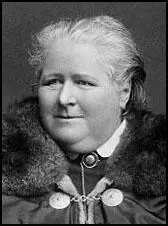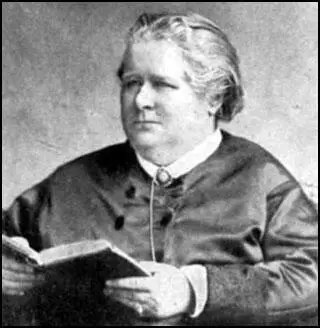Frances Power Cobbe

Frances Power Cobbe, the fifth child and only daughter of Charles Cobbe (1781–1857), an Anglo-Irish landowner, and his wife, Frances Conway (1777–1847), was born in Dublin on 4th December 1822. Cobbe was educated at home, except for two years at a school in Brighton. According to her biographer, Barbara Caine: "Cobbe regarded her schooling, which cost £1000, as an interruption to her education and a complete waste of time. The noise, frivolity, pointless routine, and complete lack of intellectual stimulation contrasted strongly with her pleasurable life at home, spent in close contact with her accomplished and beloved mother."
In 1838 Cobbe was recalled from school when her mother's ill health made it necessary for her to take over the housekeeping. She continued to study and her loss of faith caused considerable distress to her mother, who died in 1847. When she confessed some of her religious doubts to her father she was banished from the house to live with her brother. After several months she was allowed home to act as housekeeper. Cobbe further upset her father by publishing Essay on the Theory of Intuitive Morals (1855).
Cobbe's was left a small legacy when her father died in 1857. The following year she moved to Bristol, where she lived with Mary Carpenter, the Unitarian social reformer and philanthropist, assisting her with her ragged schools and reformatory work. Barbara Caine has pointed out: "This arrangement lasted only a few months. Cobbe desired a more intimate form of friendship than Carpenter was able to offer - and Carpenter's complete lack of interest in creature comforts was intolerable to Cobbe."
She now moved to London where she earned her living by writing for newspapers and journals. In 1861 her articles on the subject of women's rights brought her into contact with leading feminists such as Barbara Bodichon and Lydia Becker. She also became friendly with John Stuart Mill who encouraged her in her writing. Cobbe also became a member of the Married Women's Property Committee. 1867 she joined the London Society for Women's Suffrage.
Cobbe published several articles on the legal rights of women in marriage. This included Criminals, Idiots, Women and Minors (1869). Another pamphlet, Wife Torture, which proposed that wife assault should be made grounds for a legal separation, and this influenced the 1878 Matrimonial Causes Act which gave a wife the right to a separation with maintenance, and with custody of any child under ten years of age.

Olive Banks argued: "Her (Frances Power Cobbe) feminism was in many respects aggressive in its attitude to men. In another of her pamphlets, Criminals, Idiots, Women and Minors published in 1869, she argued that men made women economically dependent so that their authority would go unchallenged. Moreover, it was women's economic dependence which made it possible for men to go on ill-treating their wives.... At the same time some of her views were decidedly conservative. In a later pamphlet, The Duties of Women (1881), she stressed that once a woman was a wife and mother these duties were of paramount importance and other interests must be subordinate. She was also firmly conventional in her attitude to sexual morality and in the same pamphlet, condemned the loose living indulged in by advanced women."
Cobbe was also involved in the campaign against vivisection. In 1870 she advocated strengthening the law on experiments on animals, and over the next few years became one of the leaders of the British anti-vivesection movement. It has been argued that there may have "been an identification on her part between man's brutality to animals and his brutality to women."
In 1884 a legacy enabled Cobbe to retire to Wales with Mary Lloyd, a woman she had lived with since 1860. As her biographer has pointed out: "At no time in her life does she seem to have felt any attraction to a man and according to her own account, no man was ever attracted by her." In 1891 she inherited a quite considerable sum as the residuary legatee of the widow of Richard Vaughan Yates, a devoted anti-vivisectionist.
Frances Power Cobbe, who published her autobiography, The Life of Francis Power Cobbe by Herself (1894) died at Hengwrt on 5 April 1904. She was buried in Llanelltyd churchyard, alongside her beloved Mary Lloyd who had died in 1896.
Primary Sources
(1) Olive Banks, The Biographical Dictionary of British Feminists (1985)
Her (Frances Power Cobbe) feminism was in many respects aggressive in its attitude to men. In another of her pamphlets, Criminals, Idiots, Women and Minors published in 1869, she argued that men made women economically dependent so that their authority would go unchallenged. Moreover, it was women's economic dependence which made it possible for men to go on ill-treating their wives.... At the same time some of her views were decidedly conservative. In a later pamphlet, The Duties of Women (1881), she stressed that once a woman was a wife and mother these duties were of paramount importance and other interests must be subordinate. She was also firmly conventional in her attitude to sexual morality and in the same pamphlet, condemned the loose living indulged in by advanced women."
(2) Barbara Caine, Oxford Dictionary of National Biography (2004)
Cobbe was a somewhat difficult colleague. One of the few mid-Victorian feminists who came from the Anglo-Irish landed gentry, she carried from childhood a commitment to the Conservative Party, a belief that it was better to work through influential individuals rather than with popular support, and a particular sense of decorum. She was unhappy with committees which did not entirely endorse her views, and ended her association with a number of feminist colleagues when they refused to give wholehearted support to her anti-vivisection campaign.
Cobbe's greatest contribution to the women's movement came from her writing. She published in almost every major periodical, writing on the problems of marriage and the virtues of celibacy; the need for women to have independent activities; and on the persistent ill health of women, which resulted from fashions which constricted their bodies, from a medical profession which defined women as invalids, and from the fact that, unlike men, women lacked the services of a wife....
The core of Cobbe's feminism lay in her belief in the moral autonomy of women on the one hand, and in her strong sense of sexual difference on the other. Women were rational beings with a primary duty to themselves and to their God, she argued, hence they could not submit themselves absolutely to the demands of either husband or parents. But Cobbe believed emphatically in the importance of sexual difference.

